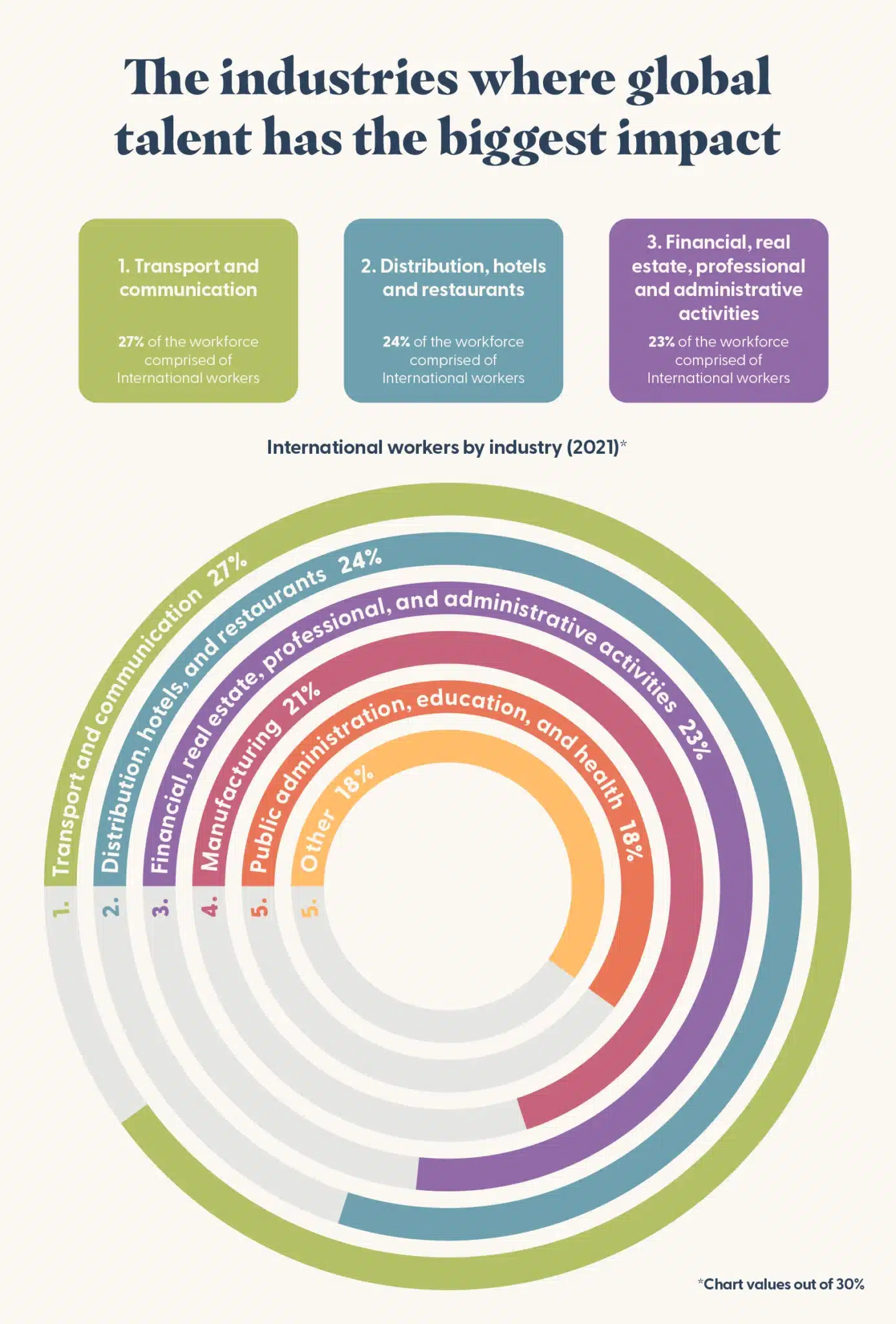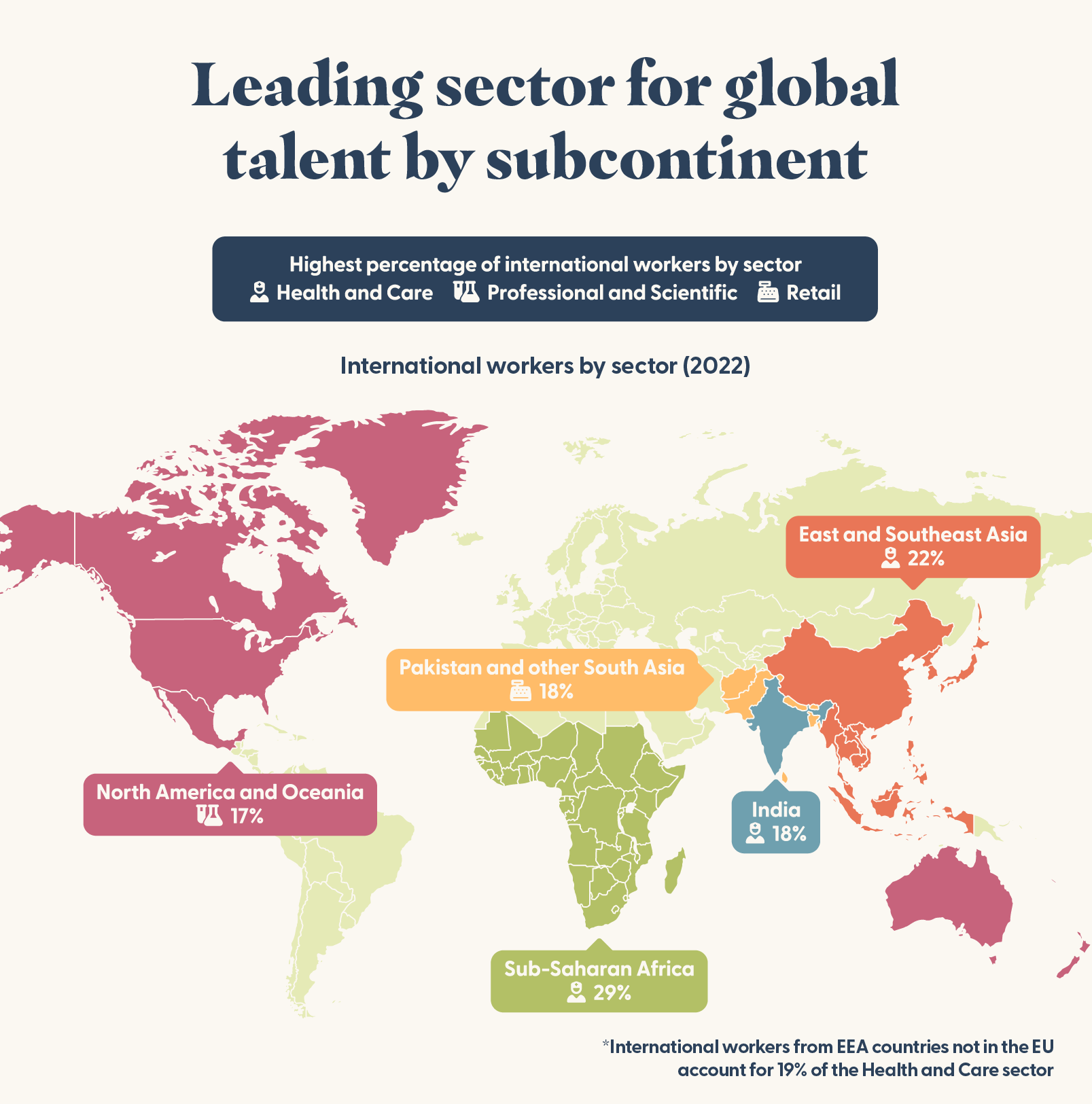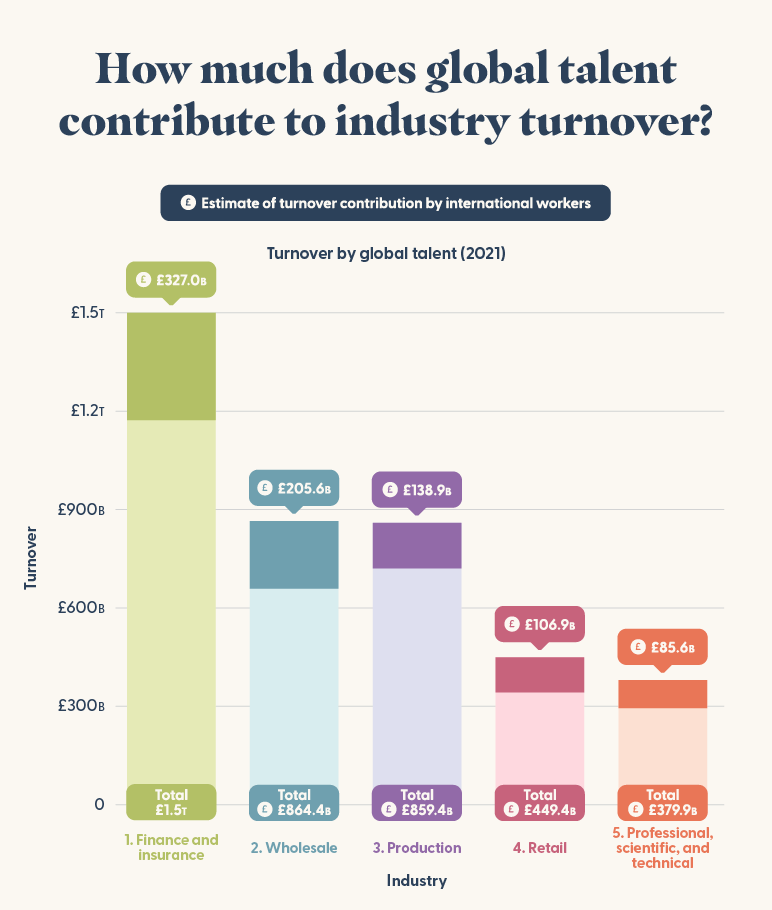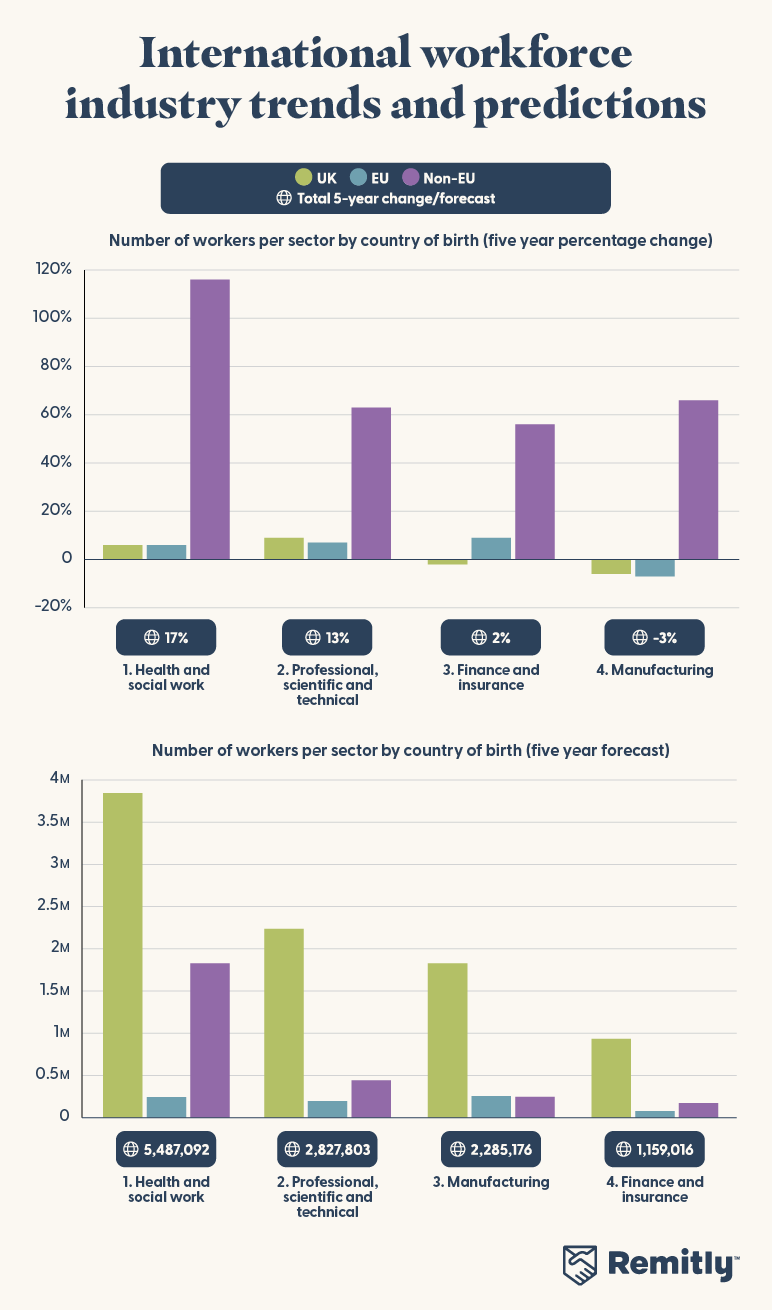The UK’s workforce is more diverse than ever, with international workers making an essential contribution to the country’s economy. Following Brexit, UK immigration patterns shifted significantly. Due to the end of free movement, EU citizen migration sharply declined. At the same time, non-EU skilled worker migration rose, leading to a higher reliance on non-EU workers.
Now, the international workforce makes up a significant share of key industries such as transport, communication, and finance, contributing essential skills and expertise. Across the country, global talent helps diversify the workforce, strengthening vital sectors.
Our data experts have explored the industries where global talent has the biggest impact, their estimated impact on annual turnover, and the essential jobs they perform. Take a look through the findings below on how these workers contribute to the UK’s economy.
Key findings
- Over a quarter of the UK’s transport and communication workforce is international. 27% of employees in this sector were born outside the UK, in job roles including bus drivers and broadcasting journalists.
- The UK’s healthcare sector increasingly employs non-EU-born workers. Their numbers have risen by 116% in five years, and if trends continue at the same rate, over 1.8 million could be employed by 2028.
- Manufacturing employment is shifting towards workers born outside the EU. Employment of workers born in countries like Poland, Slovakia, and Lithuania has declined by 16%, while non-EU employment has surged by 66% since 2018.
- The financial sector benefits most from internationally-born workers. They contribute an estimated £327 billion to the sector’s annual turnover, with strong growth projected over the next five years.
- Future employment trends point to continued international workforce growth. Healthcare, finance, and professional services are set to see the biggest increases by 2028.
From transport to finance: the industries where global talent has the biggest impact

The UK’s economy thrives on an international workforce, which plays a crucial role in some of the country’s biggest industries. From supporting transport networks to driving growth in the hotel and restaurant industries, many sectors recruit internationally-born workers.
- Transport and communication – 27% of the workforce comprised of foreign-born workers
According to data from the Office for National Statistics (ONS), transport and communication leads, with 27% of its workforce being international. Involving jobs in logistics, public transport, and infrastructure, skilled workers from around the world help keep the UK moving and connected. This sector includes job roles such as bus drivers, broadcast journalists, and postal workers with salaries varying widely. Postal workers earn around £33,561 per year, while those in programming and broadcasting make around £47,269, reflecting the diverse skill levels within the industry. - Distribution, hotels and restaurants – 24% of the workforce comprised of foreign-born workers
The distribution, hotels, and restaurants sectors follow, with almost a quarter (24%) of employees born outside the UK. Internationally-born workers help to meet demand in many hospitality and culinary businesses, especially in major cities and tourist destinations. Popular jobs in this industry include restaurant and bar workers, who earn around £15,239 a year and hotel workers, who make an average salary of £21,729. - Financial, real estate, professional and administrative activities – 23% of the workforce comprised of foreign-born workers
Financial, real estate, professional, and administrative activities are also strengthened by global talent, which is under a quarter (23%) of the workforce. London’s economic sector, in particular, attracts professionals from across the globe, helping maintain the UK’s position as a world-leading financial hub. Many of these positions are filled by global workers in job roles like landlords involved in renting and leasing, who earn around £34,577 a year, and financial services workers like accountants, earning an average of £50,502.
Healthcare leads for Indian and African-born workers – Manufacturing tops the list for EU workers

Data from The Migration Observatory shows that the UK’s health and care sector is the single largest employer of global talent, with 16% of all migrants working there. Those from India, Sub-Saharan Africa, and East and Southeast Asia comprise a significant workforce.
- Indian-born workers are highly represented in healthcare, with 18% of all UK-based Indian-born employees working in this sector. Many fill essential roles as doctors, nurses, and care workers.
- East and Southeast Asian-born workers also play a large role, with 22% employed in health and care, commonly contributing to medicine, research, and caregiving. This includes workers from countries such as China, Malaysia, and Japan.
- 29% of UK-based workers who were born in Sub-Saharan Africa are employed in the health and care industry.
Those from Sub-Saharan Africa working in the UK’s many migrant-supported industries can use Remitly to send money to Nigeria or make money transfers to Ghana and join the millions of customers who trust Remitly to send money home.
Manufacturing is the top industry for EU-born workers, employing 12% of those born in the EU and working in the UK. Countries like Poland, Slovakia, and Lithuania stand out, with 16% of professionals from these countries supporting the UK’s manufacturing industry. Job roles in this industry include machine operators and production supervisors.
Workers from North America and Oceania, including those born in the United States and Australia, are more likely to be employed in professional and scientific industries, with 17% working in these sectors. Popular job roles in this sector include research scientists and civil engineers.
The international workforce adds an estimated £327 billion to the UK finance industry

Global talent contributes significantly to the UK’s economy, as shown by ONS data on turnover and worker place of birth by industry. This is most evident in the finance sector, where internationally-born professionals significantly benefit industry turnover.
- Finance and insurance – £327.0 billion estimated turnover contribution by foreign-born workers
The finance and insurance sector has the most significant economic impact, with the international workforce contributing an estimated £327 billion in turnover annually. This includes job roles like investment bankers, financial analysts, and accountants. The industry turns over £1.5 trillion a year, and the workforce comprises 23% international workers. - Wholesale – £205.6 billion estimated turnover contribution by foreign-born workers
With a total turnover of £864.8 billion and almost a quarter (24%) of the workforce being born internationally, the estimated contribution by the international workforce is £205.6 billion. This sector covers logistics coordinators, supply chain managers, and motor vehicle technicians. - Production – £138.9 billion estimated turnover contribution by foreign-born workers
Production industries, including manufacturing and the gas and water networks, see a £138.9 billion contribution from global talent. The sector generates £859.4 billion in turnover annually, and an average of 16% of all workers are born abroad. Job roles in this industry include manufacturing engineers and machine operators.
How the international workforce could evolve in the next 5 years

By examining employment trends over the past five years, we can anticipate significant shifts in the role of the international workforce across key UK industries. As sectors evolve, immigration policies shift and global events impact labour markets, some industries may increase their employment of internationally born professionals, while others might see declines.
To estimate future employment levels, we analysed changes in employment by sector and birth country over the past five years using data from HM Revenue and Customs. We calculated the percentage change in employment for each group between December 2018 and December 2023, then applied this rate of change to the latest employment figures (December 2023) to project workforce numbers for December 2028. This method assumes that recent trends will continue at a similar pace over the next five years and provides an estimate of how international employment in key UK industries may evolve.
Employment in health and social work has risen 17% in five years, with the most significant increase (116%) coming from non-EU-born workers. If this trend continues at the same rate over the next five years, the number of non-EU-born workers in the sector will surpass 1.8 million. The demand for international nurses, carers, and medical specialists will likely increase due to NHS shortages.
Manufacturing has seen a 3% decline in total employment. While 16% of the workforce consists of EU-born workers from countries like Poland, Slovakia, and Lithuania, their share has dropped by 16% over the past five years. This suggests the industry is increasingly recruiting from non-EU countries. Between December 2018 and December 2023, the number of manufacturing workers born in non-EU countries grew by two-thirds (66%).
Employment in the professional, scientific and technical sectors has risen by 13%, primarily driven by an almost two-thirds (63%) increase in non-EU workers.
The international workforce contributes an estimated £327 billion to the finance and insurance sector, and the employment of non-EU-born workers grew by over half (56%) in the last five years. If trends continue, the number of finance and insurance employees born outside the EU could rise to 171,500 by December 2028, up from 110,300 in 2023.
Methodology
All data used in this report is the latest data available at this level of detail, ensuring the most accurate and comprehensive insights into workforce composition, economic contributions, and employment trends. The figures reflect the most recent economic patterns and labour market shifts, providing a detailed and reliable foundation for understanding the role of internationally-born workers across UK industries.
We sourced the percentage of UK-born and foreign-born workers in each UK industry as of 2021 using the Office for National Statistics Census 2021 – Economic activity status by country of birth, looking at the economically active population, excluding full-time students, that are in employment. Average salaries for the job roles mentioned were sourced from the Office for National Statistics
We sourced migrant workers by economic sector as of 2022 using The Migration Observatory – Migrants in the UK Labour Market: An Overview, looking at all people aged 16-64.
We calculated the estimated turnover contribution by foreign-born workers using the Office for National Statistics Census 2021 – Average turnover by industry, looking at the 12-month turnover for sectors in the UK. We took the percentage of foreign-born workers in each industry from Census 2021 – Economic activity status by country of birth to calculate the percentage of total turnover estimated to come from foreign-born workers.
We used the SIC codes in this release and the Census 2021 – Economic activity status by country of birth to match the industries. To calculate the foreign-born workers’ turnover contribution to the ‘production’ industry, we took the average percentage of the workforce born overseas in the ‘manufacturing’ and ‘agriculture, energy and water’ industries. The following SIC codes were not included in the Census 2021 – Economic activity status by country: B, T, and U.
To predict employment by industry and birth country in the UK in the next five years, we calculated the percentage change between the number of people employed in each sector by birth country between December 2018 and December 2023 using HM Revenue and Customs – UK payrolled employments by nationality, region, industry, age and sex. We applied each percentage to the total number of people employed in each sector by birth country in December 2023 to predict employment in December 2028.
